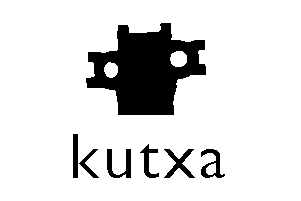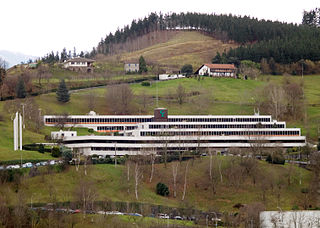
A cooperative is "an autonomous association of persons united voluntarily to meet their common economic, social and cultural needs and aspirations through a jointly owned and democratically-controlled enterprise". Cooperatives are democratically controlled by their members, with each member having one vote in electing the board of directors. Cooperatives may include:

Mondragón, officially known as Arrasate/Mondragón, is a town and municipality in Gipuzkoa Province, Basque Country, Spain. Its population in 2015 was 21,933.

José María Arizmendiarrieta Madariaga was a Basque Catholic priest and promoter of the cooperative companies of the Mondragon Corporation, originally located in the Basque Country and currently spread throughout the world. As of 2021, it is the second social economy business group in Spain, bringing together ninety-eight cooperatives, eight foundations, one mutual, ten coverage entities and seven international delegations, distributed in four areas: finance, industry, distribution and knowledge.

The Mondragon Corporation is a corporation and federation of worker cooperatives based in the Basque region of Spain.
A worker cooperative is a cooperative owned and self-managed by its workers. This control may mean a firm where every worker-owner participates in decision-making in a democratic fashion, or it may refer to one in which management is elected by every worker-owner who each have one vote.

A consumers' co-operative is an enterprise owned by consumers and managed democratically and that aims at fulfilling the needs and aspirations of its members. Such co-operatives operate within the market system, independently of the state, as a form of mutual aid, oriented toward service rather than pecuniary profit. Many cooperatives, however, do have a degree of profit orientation. Just like other corporations, some cooperatives issue dividends to owners based on a share of total net profit or earnings ; or based on a percentage of the total amount of purchases made by the owner. Regardless of whether they issue a dividend or not, most consumers’ cooperatives will offer owners discounts and preferential access to good and services.

Cooperative banking is retail and commercial banking organized on a cooperative basis. Cooperative banking institutions take deposits and lend money in most parts of the world.

Fagor Electrodoméstico was a large domestic and commercial appliance manufacturer based in the Basque Country, Spain and run by the Mondragon Corporation. Fagor was Spain's largest consumer appliance company and the fifth largest electrical appliance company in Europe, manufacturing a wide range of domestic appliances, including washing machines, refrigerators and ovens.

Cooperative economics is a field of economics that incorporates cooperative studies and political economy toward the study and management of cooperatives.
The history of the cooperative movement concerns the origins and history of cooperatives across the world. Although cooperative arrangements, such as mutual insurance, and principles of cooperation existed long before, the cooperative movement began with the application of cooperative principles to business organization.

The Kutxa is a savings bank mainly operating within a regional scope in the Gipuzkoa province of Spain. Its Spanish name is Caja de Ahorros y Monte de Piedad de Gipuzkoa y San Sebastián but it was re-branded as Kutxa. On 1 January 2012 it merged with other Basque financial entities, Bilbao Bizkaia Kutxa (BBK) and Caja Vital Kutxa, to form Kutxabank.

Mondragon University is a non-profit cooperative private university in the Basque Country, officially established and recognised in 1997. It is part of the Mondragon Corporation. Its main campus is in Mondragón, Gipuzkoa.

Caja Laboral Popular Cooperativa de Crédito or Caja Laboral was a Spanish credit union established in 1959 as part of the Mondragon Corporation and headquartered in Mondragón, in the Basque Country of Spain. The major financial provider behind the Basque cooperative movement, Caja Laboral covered the financial segment of Mondragon and provided banking and financial services to its customers through a network of over 370 branch offices in the Basque Country and beyond. With over 1800 employees, Caja Laboral generated annual revenue in excess of €330 million.

Bilbao Bizkaia Kutxa (BBK) (Basque for 'Bilbao Biscay Savings Bank') was a Spanish savings bank based in the province of Biscay in the Basque Country, Spain. Its full name was Bilbao Bizkaia Kutxa, Aurrezki Kutxa eta Bahitetxea (in Spanish Caja Bilbao Vizcaya, Caja de Ahorros y Monte de Piedad). It was formed in 1990 when the Caja de Ahorros Municipal de Bilbao and the Bizkaiko Aurrezki Kutxa-Caja de Ahorros Vizcaína were merged. The company headquarters were in Bilbao. On 1 January 2012 it merged with other Basque financial entities (a "loose merger"), Kutxa and Caja Vital Kutxa, to form Kutxabank.

Capital and the Debt Trap is a research monograph by Claudia Sanchez Bajo and Bruno Roelants. The first four chapters provide a general summary of the economic instability afflicting the international economy at the time of publication (2011), noting that cooperatives have on average performed better than traditional for-profit corporations. The next four chapters describe four different cooperatives in four countries. The final chapter provides a summary. Cooperatives seem on average to last longer and be more responsive to the needs of customers and the communities in which they operate, because their shared ownership and participative management generally makes labor more flexible while reducing the incentives of upper management to maximize short-term performance at the expense of the long term.

Kutxabank is a Spanish bank founded and based in Bilbao. It was officially created on 1 January 2012 out of the merger of three Basque financial institutions operating in their respective provinces: Bilbao Bizkaia Kutxa (BBK), based in Bilbao; Gipuzkoa Donostia Kutxa (Kutxa), based in San Sebastián; and Caja Vital Kutxa (Vital) based in Vitoria-Gasteiz.
The Confederation of Cooperative Companies of the Basque Country is a Basque institution founded in 1996 that represents the social economy business community of the Basque Country.

José María Ormaetxea Uribeetxebarría was a Basque businessman and cooperativist; one of the five founders in 1956 of Ulgor - later renamed Fagor Electrodomésticos - the first industrial cooperative enterprise of the Mondragon Corporation.
















